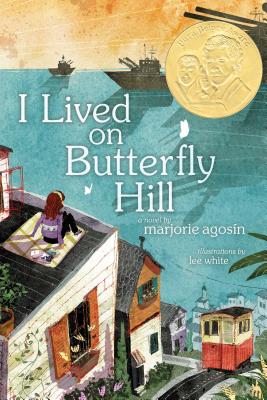Reviewed by: Deborah Menkart
Review Source: Teaching for Change
Book Author: Marjorie Agosin
While I Lived on Butterfly Hill by Marjorie Agosín is beautifully written and exposes the horrors of the overthrow of Salvador Allende in Chile through the eyes of a young girl, I was shocked to find a casual, uncritical inclusion of Gone with the Wind. For her own safety, the young protagonist comes to the U.S. after her parents go into hiding in Chile. She stays with her aunt in New England. For comfort, they watch a film together. Of all the films the author could have selected – it is Gone with the Wind. The film is introduced with NO critique. The protagonist identifies with Scarlet O’Hara. (On page 193, 11 year old Celeste is with her aunt. “‘Mesmerized, we curl up on the couch and watch all three hours of Gone with the Wind while our mouths turn blueberry-blue. Then I crawl up the stairs to my room and hope that I have a dream about Rhett Butler as I remind myself that, like Miss Scarlett said, ‘Tomorrow is another day.”‘)
Why did this film selection make it past the editors and the award committees? Another concern is the author said nothing about the U.S. role in the coup and decades of U.S. backing of the brutal dictator, Augusto Pinochet. That is no small concern given the fact that this book is written largely for U.S. readers. It reinforces the stereotype that Latin American countries are unstable, counter-posed with the “good North” that provides refuge for the protagonist. I wish an editor would have addressed both of these concerns pre-publication – or that they are both addressed for a future edition – since young people should learn about Chile.
Deborah Menkart is the executive director at Teaching for Change.

I Lived on Butterfly Hill by Marjorie Agosin
Published by Simon and Schuster on February 10th 2015
Genres: Immigration and Emigration, Latinx, South America
Pages: 464
Reading Level: Grades 6-8
ISBN: 9781416994022
Review Source: Teaching for Change
Publisher's Synopsis: An eleven-year-old’s world is upended by political turmoil in this “lyrically ambitious tale of exile and reunification” (Kirkus Reviews) from an award-winning poet, based on true events in Chile.
Celeste Marconi is a dreamer. She lives peacefully among friends and neighbors and family in the idyllic town of Valparaiso, Chile—until one day when warships are spotted in the harbor and schoolmates start disappearing from class without a word. Celeste doesn’t quite know what is happening, but one thing is clear: no one is safe, not anymore.
The country has been taken over by a government that declares artists, protestors, and anyone who helps the needy to be considered “subversive” and dangerous to Chile’s future. So Celeste’s parents—her educated, generous, kind parents—must go into hiding before they, too, “disappear.” Before they do, however, they send Celeste to America to protect her.
As Celeste adapts to her new life in Maine, she never stops dreaming of Chile. But even after democracy is restored to her home country, questions remain: Will her parents reemerge from hiding? Will she ever be truly safe again?
Accented with interior artwork, steeped in the history of Pinochet’s catastrophic takeover of Chile, and based on many true events, this multicultural ode to the power of revolution, words, and love is both indelibly brave and heartwrenchingly graceful.

Leave a Reply